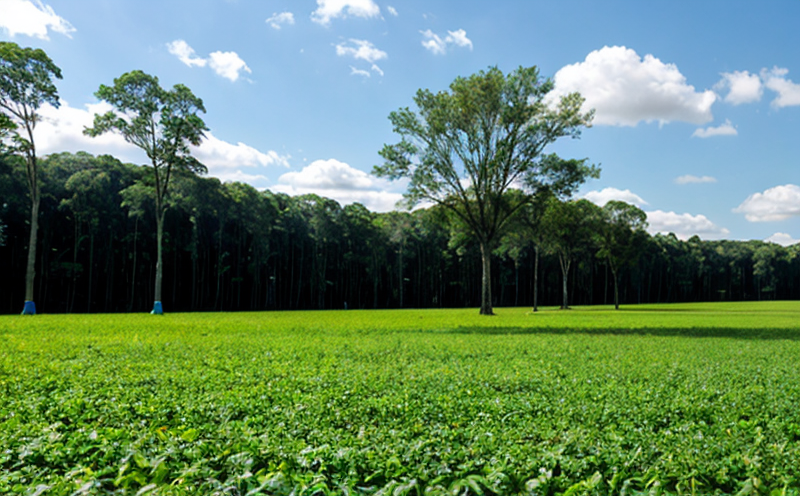Soil Toxicity Testing of Product Residues
In today's increasingly regulated and environmentally conscious market, understanding how product residues interact with soil is critical. This form of testing ensures that consumer products are not only safe for human use but also sustainable in their environmental impact. Soil toxicity testing assesses the potential adverse effects of chemical residues from consumer products on soil microorganisms, plants, and other components of the ecosystem.
The process involves a series of steps designed to mimic real-world scenarios where products might come into contact with soil through various means such as spillage or improper disposal. This includes thorough laboratory simulation and controlled environments that replicate different environmental conditions to ensure accurate results.
Accurate identification of product residues is the first step in this process, followed by their application to a representative soil sample. The sample undergoes exposure under defined conditions over an appropriate period, allowing for observation of any negative impacts on the soil's biological activity and structure.
The testing methodologies employed adhere strictly to international standards such as ISO 17266:2015 and ASTM D860-13e1. These standards provide a framework that ensures consistency and reliability in test results, which is crucial for regulatory compliance and stakeholder trust.
Once the exposure period concludes, detailed analysis of soil parameters follows to determine any changes or degradation caused by the product residues. Parameters measured include microbial activity levels, nutrient availability, pH balance, and overall health indicators of the soil ecosystem.
The comprehensive nature of this testing ensures that not only immediate effects but also long-term impacts are evaluated. This approach helps manufacturers make informed decisions about their product formulations to minimize environmental footprint while maintaining safety standards.
For industries such as agriculture, pharmaceuticals, and household chemicals, ensuring that products do not harm soil can significantly enhance brand reputation and consumer confidence. Compliance with stringent regulations is also a key benefit, offering protection against potential legal challenges or recalls due to harmful residues.
The importance of accurate and reliable testing cannot be overstated in this context. Misleading results could lead to suboptimal product formulations that do not meet safety and sustainability goals, while thorough testing ensures that products are both safe and environmentally friendly.
Why It Matters
The significance of soil toxicity testing extends beyond mere compliance with regulations; it plays a pivotal role in safeguarding public health and environmental integrity. Products such as pesticides, fertilizers, and household cleaning agents can leave behind residues that persist in the soil for extended periods if not managed properly.
These residues can disrupt soil microbial communities, reduce fertility, and affect plant growth. In severe cases, they may even leach into groundwater supplies, causing broader ecological damage. By conducting thorough toxicity tests, manufacturers ensure their products contribute positively to ecosystem health rather than harm it.
The findings from these tests provide valuable insights for R&D teams to innovate safer formulations that minimize adverse effects on soil while maintaining efficacy and performance. Procurement departments also benefit by selecting suppliers who adhere strictly to such rigorous testing protocols, thereby enhancing overall supply chain integrity.
From a regulatory perspective, compliance with stringent environmental standards not only avoids penalties but also demonstrates corporate responsibility towards sustainability initiatives. This proactive approach fosters trust among stakeholders, including consumers and government bodies, ultimately leading to more sustainable business practices across industries.
Quality and Reliability Assurance
The quality and reliability of soil toxicity testing are paramount for ensuring accurate assessment of product impacts on the environment. Our laboratory adheres rigorously to established international standards like ISO 17266:2015, ASTM D860-13e1, and EN 14398 to guarantee consistent and precise results.
Our state-of-the-art facilities utilize advanced instrumentation such as pH meters, conductivity probes, and automated incubators designed specifically for this type of testing. These tools allow us to monitor critical parameters throughout the exposure periods accurately.
We employ highly skilled chemists and environmental scientists who possess extensive experience in handling complex samples and interpreting results within the context of real-world applications. Their expertise ensures that every test is conducted under optimal conditions, minimizing variability and enhancing accuracy.
Data analysis employs sophisticated software capable of processing large datasets quickly and efficiently, enabling rapid identification of trends and anomalies. This allows for timely reporting to clients with actionable recommendations based on robust evidence.
Our commitment to quality does not stop at technical expertise; we also maintain strict adherence to ethical practices ensuring all tests are conducted transparently and without bias. Regular calibration and validation of equipment further reinforce our dedication to excellence in every aspect of our operations.
Customer Impact and Satisfaction
The outcomes of soil toxicity testing have a direct impact on customer satisfaction across various sectors, particularly those dealing with consumer products. By ensuring that the products they market do not pose risks to soil health or contribute negatively to environmental degradation, companies can build stronger reputations for sustainability.
Customers increasingly seek out brands committed to responsible practices, and demonstrating compliance through rigorous testing can significantly enhance brand loyalty and trust. This is especially true in markets where eco-friendly options are becoming more popular among consumers.
For R&D teams, the insights gained from these tests help guide future product development efforts towards creating safer alternatives that still meet market demands effectively. The ability to innovate within regulatory constraints fosters creativity and innovation, leading to better-performing products without compromising safety or environmental responsibility.
In terms of procurement, selecting suppliers who undergo thorough testing provides peace of mind regarding the quality and reliability of purchased materials. It ensures that only those meeting high standards are incorporated into supply chains, thereby maintaining overall product integrity.
Ultimately, by prioritizing soil toxicity testing, businesses contribute positively to global sustainability goals while enjoying enhanced reputation among stakeholders. This aligns with broader societal trends toward greater awareness and appreciation for environmental stewardship.





